China-Russia remark by Britain’s Liz Truss ‘nothing short of demented’, Australia’s ex-PM Paul Keating says
The British foreign secretary told The Sydney Morning Herald Beijing may use a Russian invasion of Ukraine as a chance to launch its own aggression
Keating, who has pushed for more engagement with China, said Britain ‘does not add up to a row of beans’ in regards to East Asia
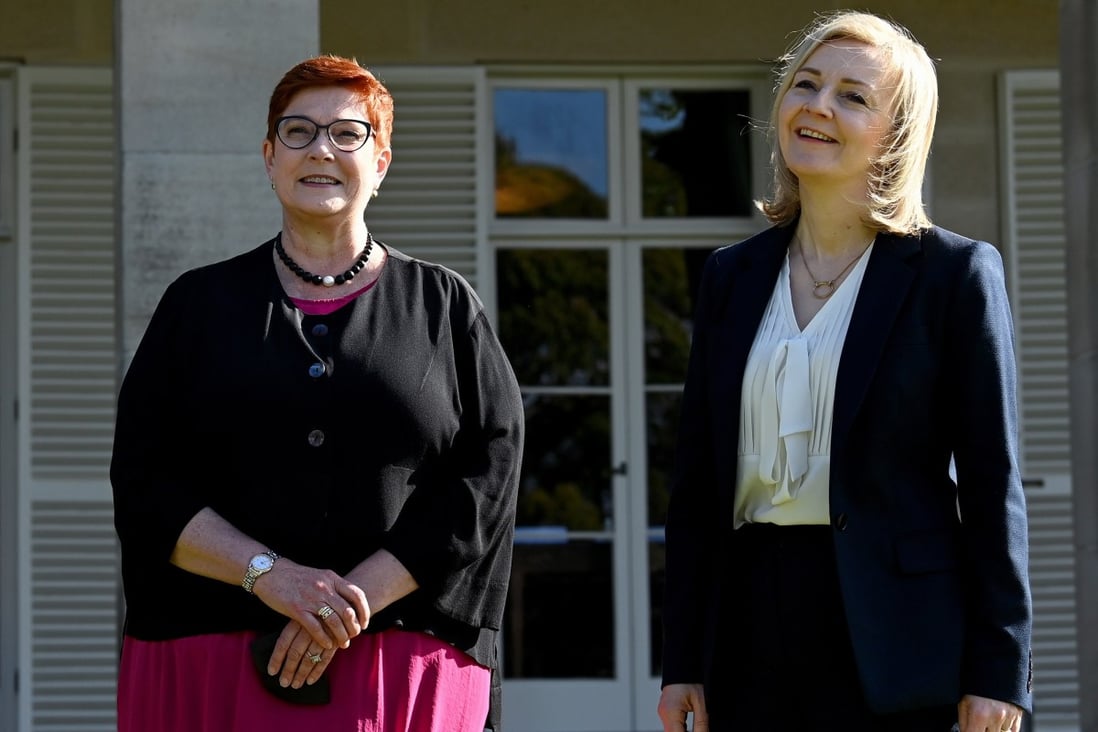
Australian Foreign Minister Marise Payne (left) and British Foreign Secretary Liz Truss prior to Australia-UK Ministerial Consultations (AUKMIN) talks in Sydney last week. Former Australian PM Paul Keating has called some of Truss’ remarks about China “demented”. Photo: EPA-EFE
British Foreign Secretary Liz Truss’ assertion that China might use a Russian invasion of Ukraine as an opportunity to launch aggression of its own in the Indo-Pacific has sparked debate in Australia, with a former prime minister calling Truss’ remarks “nothing short of demented”.
Leading the criticism, Paul Keating, in a weekend op-ed, said her remarks after a bilateral security and defence meeting were “not simply irrational, demented”.
His comments follow a speech he gave at the National Press Club in Canberra in November in which the former leader, prime minister from 1991 to 1996, criticised the Australian government for leading its people “astray” on China and for formulating a plan to buy nuclear-powered submarines under a new security alliance with the UK and US.
His speech attracted a rebuke from Australian prime minister Scott Morrison who called it “out of line” with national policy.
During an interview with The Sydney Morning Herald and The Age, Truss was reported to warn that China could use a Russian invasion as an opportunity to launch its own aggression.
“I don’t think we can rule that out,” Truss said. “Russia is working more closely with China than it ever has. Aggressors are working in concert and I think it’s incumbent on countries like ours to work together.”
On Monday, the US asked families of its diplomats to leave Ukraine ahead of a potential Russian invasion and Britain began withdrawing staff from its embassy in Ukraine.
British Foreign Secretary Liz Truss’ assertion that China might use a Russian invasion of Ukraine as an opportunity to launch aggression of its own in the Indo-Pacific has sparked debate in Australia, with a former prime minister calling Truss’ remarks “nothing short of demented”.
Leading the criticism, Paul Keating, in a weekend op-ed, said her remarks after a bilateral security and defence meeting were “not simply irrational, demented”.
His comments follow a speech he gave at the National Press Club in Canberra in November in which the former leader, prime minister from 1991 to 1996, criticised the Australian government for leading its people “astray” on China and for formulating a plan to buy nuclear-powered submarines under a new security alliance with the UK and US.
His speech attracted a rebuke from Australian prime minister Scott Morrison who called it “out of line” with national policy.
During an interview with The Sydney Morning Herald and The Age, Truss was reported to warn that China could use a Russian invasion as an opportunity to launch its own aggression.
“I don’t think we can rule that out,” Truss said. “Russia is working more closely with China than it ever has. Aggressors are working in concert and I think it’s incumbent on countries like ours to work together.”
On Monday, the US asked families of its diplomats to leave Ukraine ahead of a potential Russian invasion and Britain began withdrawing staff from its embassy in Ukraine.
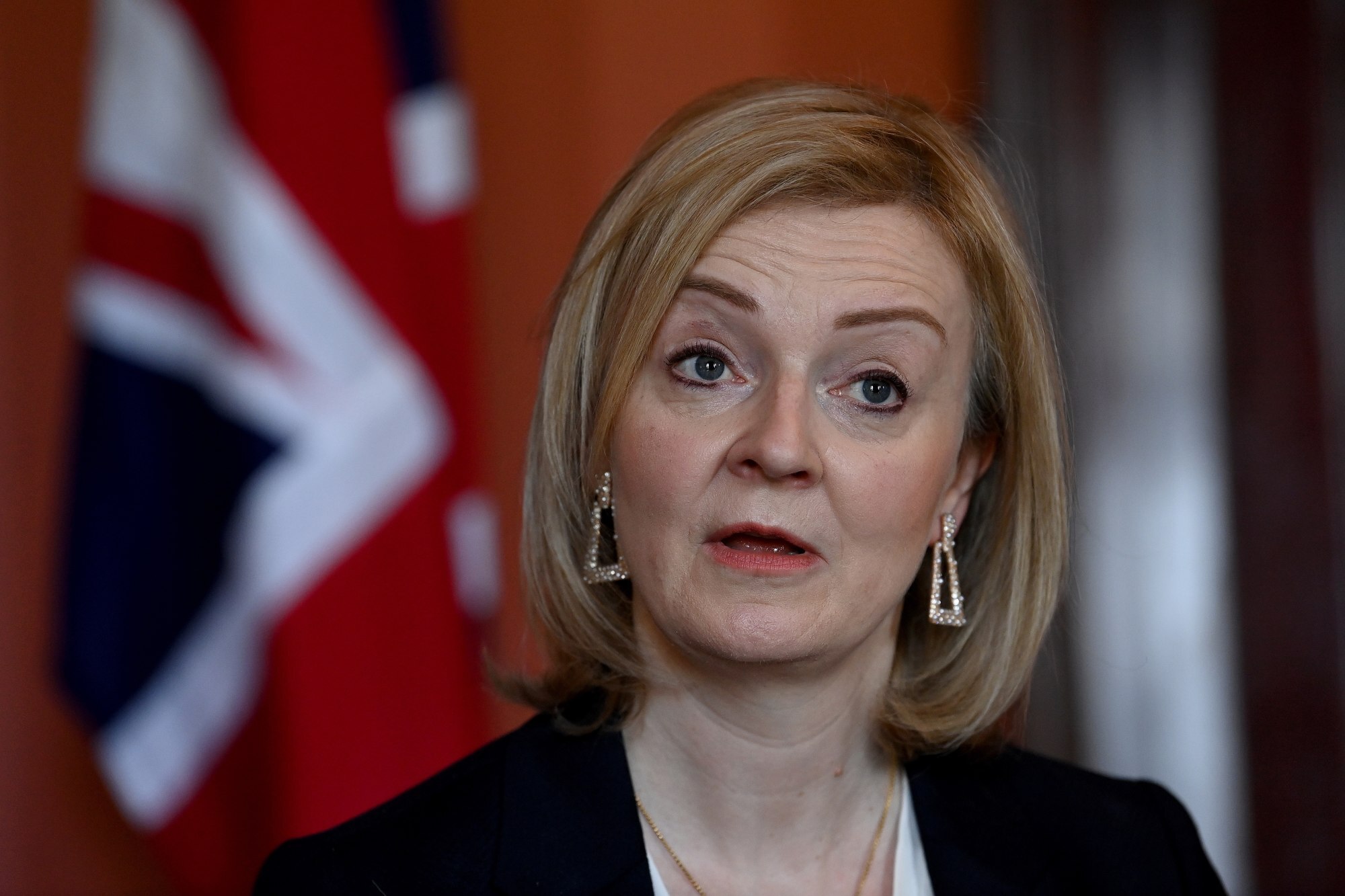
British Foreign Secretary Liz Truss. Some of her China-related comments have been branded “demented” by former Australian PM Paul Keating. Photo: EPA-EFE
Truss, who was in Sydney for talks with Australian counterpart Marise Payne, is cited as a leading contender for Britain’s prime ministership in the event scandal-plagued Boris Johnson is forced out.
Keating, writing in public policy journal Pearls and Irritations, referenced the weekend interview Truss gave during the Australia-UK Ministerial Consultations (AUKMIN) bilateral meeting, which took place last week.
US predicts Russia will ‘move in’ on Ukraine as UK and Canada send arms and special forces
Keating, who led a centre-left Labour Party government, said Truss’s comments amplified the Australian government’s “desperate promotion of Britain as a strategic partner of Australia in a policy of containment of China”.
“The reality is Britain does not add up to a row of beans when it comes to East Asia,” he said.
Truss, who was in Sydney for talks with Australian counterpart Marise Payne, is cited as a leading contender for Britain’s prime ministership in the event scandal-plagued Boris Johnson is forced out.
Keating, writing in public policy journal Pearls and Irritations, referenced the weekend interview Truss gave during the Australia-UK Ministerial Consultations (AUKMIN) bilateral meeting, which took place last week.
US predicts Russia will ‘move in’ on Ukraine as UK and Canada send arms and special forces
Keating, who led a centre-left Labour Party government, said Truss’s comments amplified the Australian government’s “desperate promotion of Britain as a strategic partner of Australia in a policy of containment of China”.
“The reality is Britain does not add up to a row of beans when it comes to East Asia,” he said.
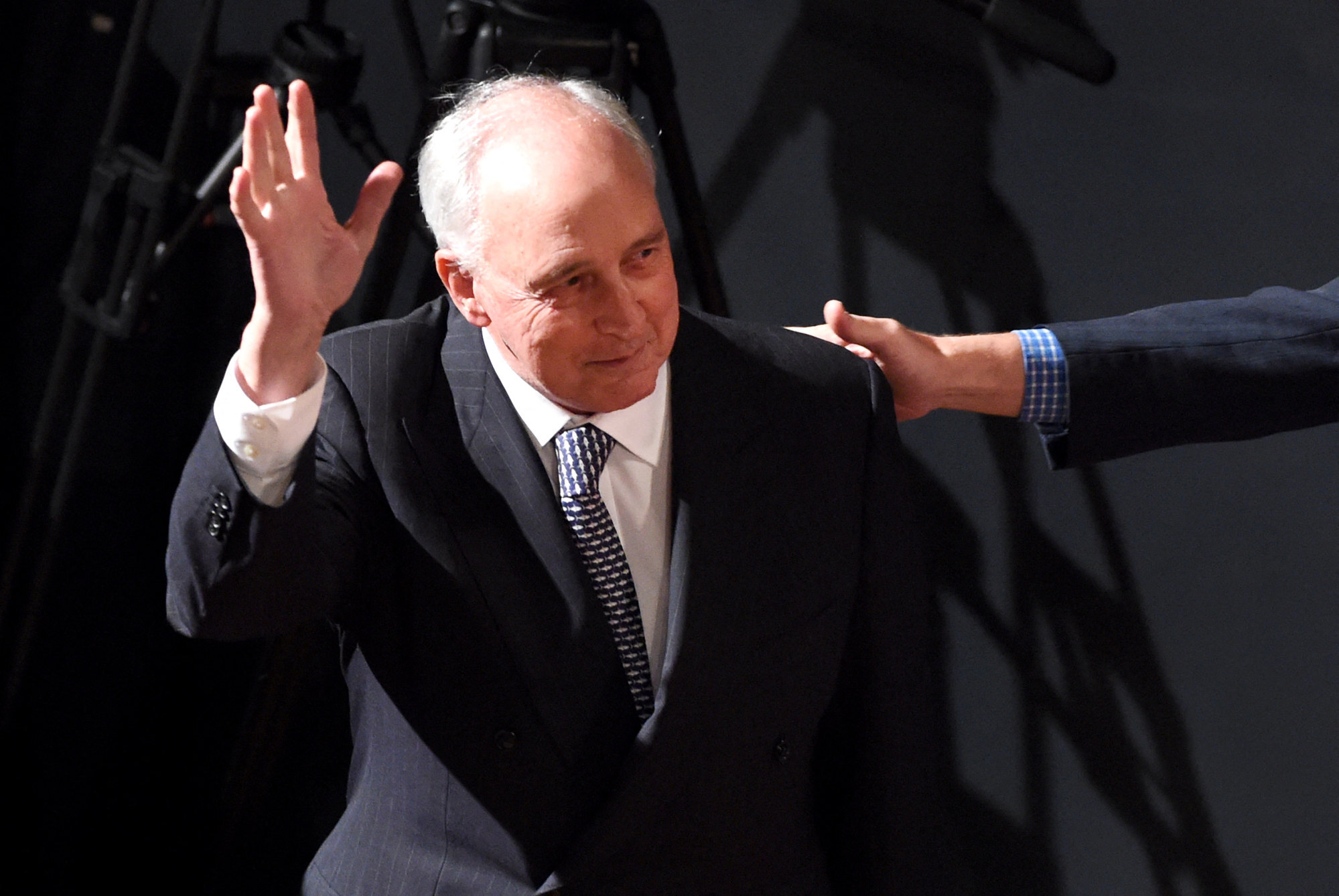
Former Australian prime minister Paul Keating. File photo: AFP
The AUKMIN meeting on Friday focused on geopolitical challenges including the Ukraine situation with the two nations agreeing to “step up collaboration to deter malign threats” and work together on areas like cyber and technology to defend security and uphold democratic values.
Truss said in a press release that “with the world facing increasing aggression from malign actors”, alliances between freedom-loving democracies were essential to “win the battle of ideas”.
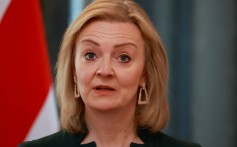
“What happens in Eastern Europe matters for the world,” she said. “Threats to freedom, democracy and the rule of law are not just regional, they’re global,” Truss also said, in a speech at Australian think-tank, the Lowy Institute, on Friday.
“And that’s why we have to respond together. Iran’s nuclear programme has never been more advanced. China has been conducting military flights near Taiwan. And it is using its economic muscle to attempt to coerce democracies like Australia and Lithuania.”
The AUKMIN meeting on Friday focused on geopolitical challenges including the Ukraine situation with the two nations agreeing to “step up collaboration to deter malign threats” and work together on areas like cyber and technology to defend security and uphold democratic values.
Truss said in a press release that “with the world facing increasing aggression from malign actors”, alliances between freedom-loving democracies were essential to “win the battle of ideas”.

“What happens in Eastern Europe matters for the world,” she said. “Threats to freedom, democracy and the rule of law are not just regional, they’re global,” Truss also said, in a speech at Australian think-tank, the Lowy Institute, on Friday.
“And that’s why we have to respond together. Iran’s nuclear programme has never been more advanced. China has been conducting military flights near Taiwan. And it is using its economic muscle to attempt to coerce democracies like Australia and Lithuania.”
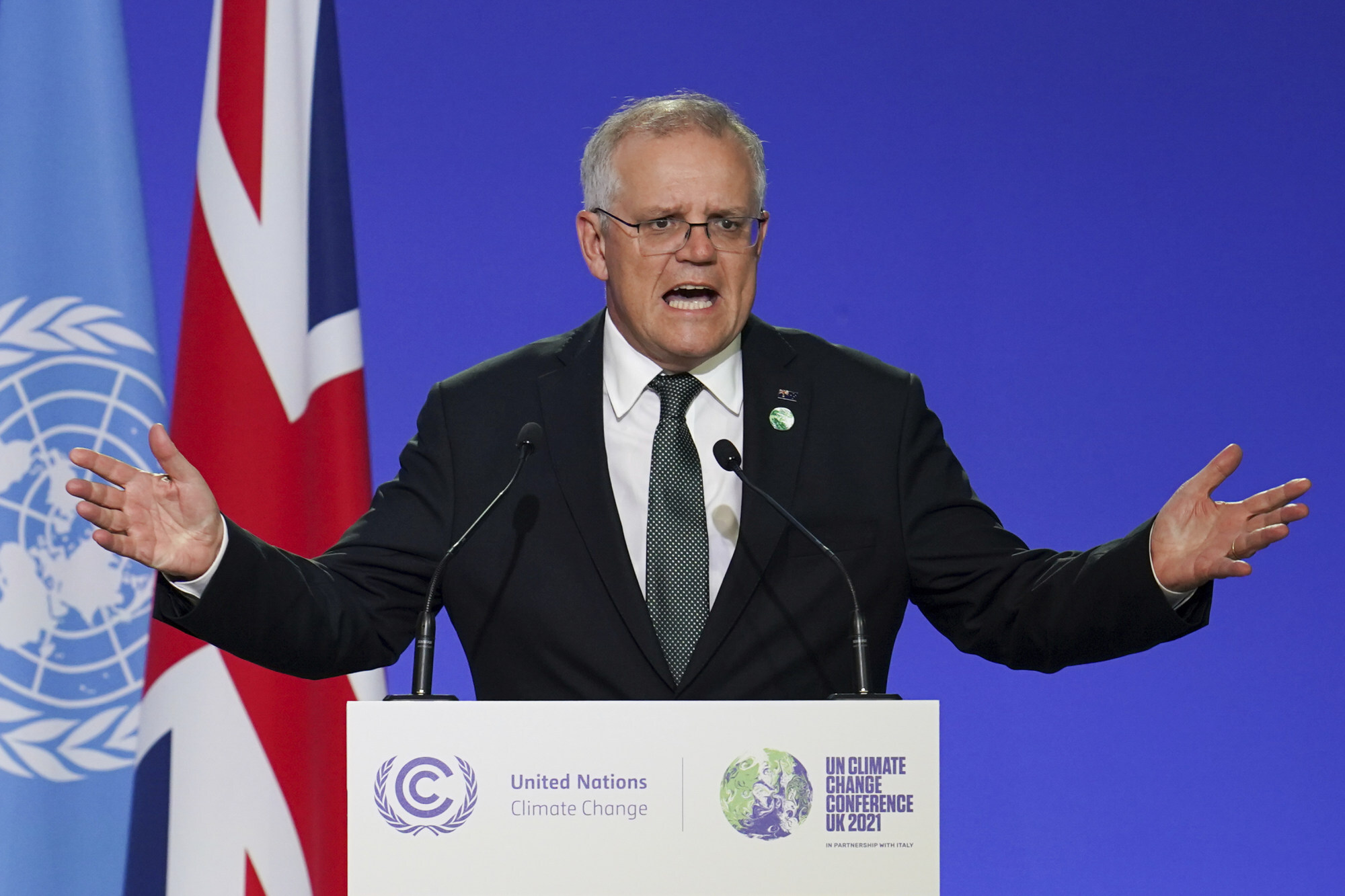
Australia’s Prime Minister Scott Morrison during the COP26 Summit in Scotland in November. Photo: via AP
After AUKMIN concluded last week, it emerged on Monday that Prime Minister Morrison’s Chinese messaging WeChat app account had been hacked as senior members of his cabinet accused the Chinese Communist Party of foreign interference.
Tencent, the Chinese tech giant that owns WeChat, denied the account was hacked or removed from its platform.
Some commentators were not convinced Britain was an effective strategic partner with some labelling the AUKMIN meeting as hyped-up nostalgia of a bygone “British Australia”.
The University of Sydney’s professor of history James Curran, who previously held roles in the government’s defence and intelligence departments, said history had shown “Australian leaders mistakenly believed cultural affinity with Britain guaranteed shared strategic purpose in Asia”.
“While British and European interest and support for regional stability in Asia is welcome, we need to be realistic about what, materially, countries like the UK can provide in substantive terms in the event of hostilities breaking out,” Curran said.
“The reality is their contribution would be very limited, just as Canberra could offer little in the event of a conflict over Ukraine.”
Curran also said the UK’s weakness in terms of a China strategy was laid bare when Truss said that to mitigate economic dependence on China, like-minded countries should steer towards more rules-based trading blocs like the Comprehensive and Progressive Agreement for Trans-Pacific Partnership (CPTPP), a pact China was also looking to join.
“The British Foreign Secretary’s muddled thinking on the CPTPP reflects how the UK and Australia are prioritising new Cold War rhetoric over developing a clearly defined China policy,” he said.
John Blaxland, a professor of international security and intelligence studies at the Australian National University, said Australia and the UK’s agreement to cooperate was no different to many alliances such as the Five Eyes intelligence-sharing arrangement, involving the US, Britain, Canada, Australia and New Zealand, which was not a relationship between “colonial master and subordinate”.
“It’s a relationship between peers, formed by shared interests reinforced by common values, experiences and outlooks.”
“The UK and Australia are US allies who are looking to engage with each other, and also help retain US engagement with the world.”
The relationship between Australia and Britain was also mutually beneficial, he added, as Britain’s new post-Brexit global plans, including validating its special relationship with the US and increasing trade with Japan, Australia and others in the Indo-Pacific, overlapped with those of Australia.
After AUKMIN concluded last week, it emerged on Monday that Prime Minister Morrison’s Chinese messaging WeChat app account had been hacked as senior members of his cabinet accused the Chinese Communist Party of foreign interference.
Tencent, the Chinese tech giant that owns WeChat, denied the account was hacked or removed from its platform.
Some commentators were not convinced Britain was an effective strategic partner with some labelling the AUKMIN meeting as hyped-up nostalgia of a bygone “British Australia”.
The University of Sydney’s professor of history James Curran, who previously held roles in the government’s defence and intelligence departments, said history had shown “Australian leaders mistakenly believed cultural affinity with Britain guaranteed shared strategic purpose in Asia”.
“While British and European interest and support for regional stability in Asia is welcome, we need to be realistic about what, materially, countries like the UK can provide in substantive terms in the event of hostilities breaking out,” Curran said.
“The reality is their contribution would be very limited, just as Canberra could offer little in the event of a conflict over Ukraine.”
Curran also said the UK’s weakness in terms of a China strategy was laid bare when Truss said that to mitigate economic dependence on China, like-minded countries should steer towards more rules-based trading blocs like the Comprehensive and Progressive Agreement for Trans-Pacific Partnership (CPTPP), a pact China was also looking to join.
“The British Foreign Secretary’s muddled thinking on the CPTPP reflects how the UK and Australia are prioritising new Cold War rhetoric over developing a clearly defined China policy,” he said.
John Blaxland, a professor of international security and intelligence studies at the Australian National University, said Australia and the UK’s agreement to cooperate was no different to many alliances such as the Five Eyes intelligence-sharing arrangement, involving the US, Britain, Canada, Australia and New Zealand, which was not a relationship between “colonial master and subordinate”.
“It’s a relationship between peers, formed by shared interests reinforced by common values, experiences and outlooks.”
“The UK and Australia are US allies who are looking to engage with each other, and also help retain US engagement with the world.”
The relationship between Australia and Britain was also mutually beneficial, he added, as Britain’s new post-Brexit global plans, including validating its special relationship with the US and increasing trade with Japan, Australia and others in the Indo-Pacific, overlapped with those of Australia.
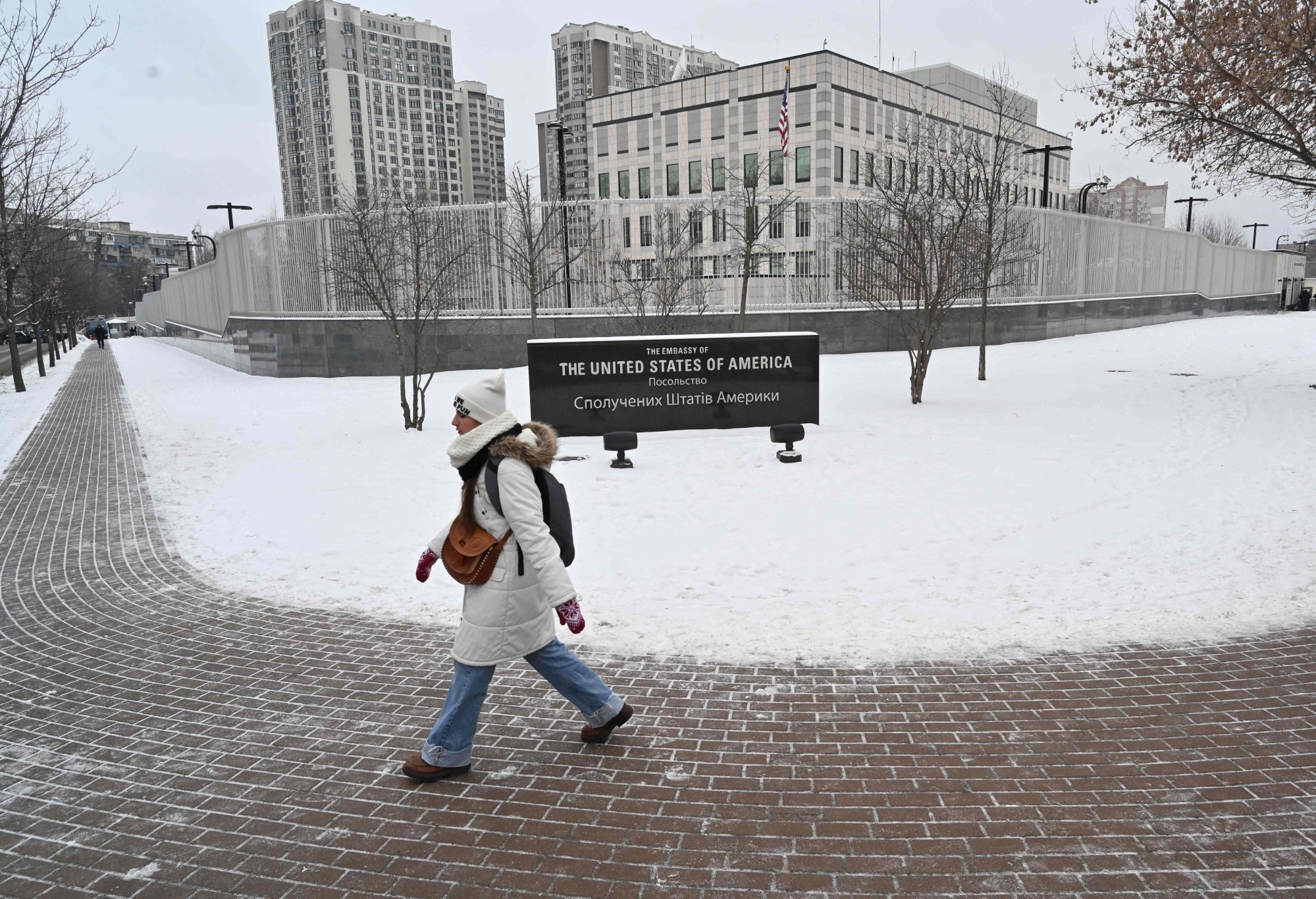
A woman walks past the US Embassy in Kyiv on Monday. The US has asked families of its diplomats to leave ahead of a potential Russian invasion. Photo: AFP
Similarly, Truss’s warning on a Ukraine-triggered Chinese attack was not unfounded, Blaxland said, as history had shown that “when there’s a conflict at one end of the Eurasian land mass, it provides an opportunity for mischief at the other end”.
“China has been very assertive over the no-fly zone and really testing the limits of Taiwan’s resilience,” he said.
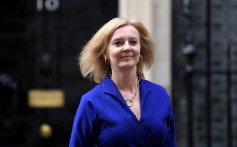
“The notion that [China] would use a crisis in Ukraine to pursue in some way, shape or form their interests in Taiwan, or perhaps the Korean peninsula, is not at all unreasonable. It’s completely logical and sensible. Every pundit out there is worried about that exact equation.”
Over the weekend, Taiwan’s ministry of foreign affairs said in a tweet the agreements made during the AUKMIN meeting “underscored the importance of peace and stability across the Taiwan Strait”.
Similarly, Truss’s warning on a Ukraine-triggered Chinese attack was not unfounded, Blaxland said, as history had shown that “when there’s a conflict at one end of the Eurasian land mass, it provides an opportunity for mischief at the other end”.
“China has been very assertive over the no-fly zone and really testing the limits of Taiwan’s resilience,” he said.

“The notion that [China] would use a crisis in Ukraine to pursue in some way, shape or form their interests in Taiwan, or perhaps the Korean peninsula, is not at all unreasonable. It’s completely logical and sensible. Every pundit out there is worried about that exact equation.”
Over the weekend, Taiwan’s ministry of foreign affairs said in a tweet the agreements made during the AUKMIN meeting “underscored the importance of peace and stability across the Taiwan Strait”.
What Liz Truss may have been rude and undiplomatic , but it is a truthful assessment.
ReplyDeleteQuite a number of strategic analysts havesaid the same.
The fact is, Paul Keating is too deeply compromised with his China consultancy, he can no longer be trusted to speak in Australia's best interests.
Paul Keating, even in his Treasurer's days in the Bob Hawke govt, was firm in his conviction Australia's place should be in Asia and thus should pay heed and respect to Asian interests and feelings - he was a good mate of President Suharto and of China - and still is today - no change
DeleteBest Buddies with corrupt human rights abuser Suharto.
DeleteEnough said about Paul Keating's amoral and unprincipled worldview.
Very similar worldview to Henry Kissinger, who is also advocating a surrender to the People's Republic of China.
Wakakakakaka…
Delete"amoral and unprincipled worldview"
Wow…
How about all those Yankee/pommie malfeasances that I DONT want to know?
Ooop… for a demoNcratic dickhead, any shits from its idols r god given fragrance to the nose.
“Aggressors are working in concert“
ReplyDelete“with the world facing increasing aggression from malign actors”
Wakakakaka…
This bitch, who is aiming to replace Boris, has hit the right tone but at the wrong target!
Who's the malign actors in initiating the russo-ukraine conflict? Who in the Taiwan strait shit-steering?
Who drove a closer sopo cooperation of China & Russia in recent time?
"It’s a relationship between peers"
Wow!!
What an ivory tower foul gaseous leak.
Peers stand on equal level of strength - be they military, economically in geological preposition. Auntie Pommie & dingo oz have NEVER achieved such degrees of equality.
The only thing they shared is that WASP narrative with declining outwardly influences of any substance in their geopolitical arena. Thus, both have to genuflect to uncle Sam to gain for moral supports!
Boris' days could very well be numbered as the British public don't take kindly at all to this bumbling uncombed-moron with a long history of smooth lying having tea parties during lockdowns. And that Truss-ting bitch hopes to take over ? Well, good luck then, this demented woman is actually even more moronic than Bumbling Boris. She would do well to view this video to get an inkling what's the real score before she opens her yapping orifice :
ReplyDeleteWatch Brian Berletic interviewing Angelo Guilano just 24 hours ago :
https://youtu.be/DO9NDZDJlag
The American-led warmongering has now seriously worried Zelensky...he's now shitting in his pants, hinting a few days ago to Biden that the old man need not give warning that Russia is about to invade his country, a that he himself should know the situation better than Biden who is thousands of miles away from Ukraine !
ReplyDeleteAnd now, the Breaking News, he finally spit out the truth, feeling trapped as he was, caught in the middle, feeling manipulated now, served him right, realising that if a war really happens, it is the Ukrainians who will die, not the Americans or the Europeans :
Press stunned as Ukraine leader points finger at the West !
https://www.fridayeveryday.com/press-stunned-as-ukraine-leader-points-finger-at-west/
revealing. Thanks JJ I'll post the link you provided, wakakaka
Delete